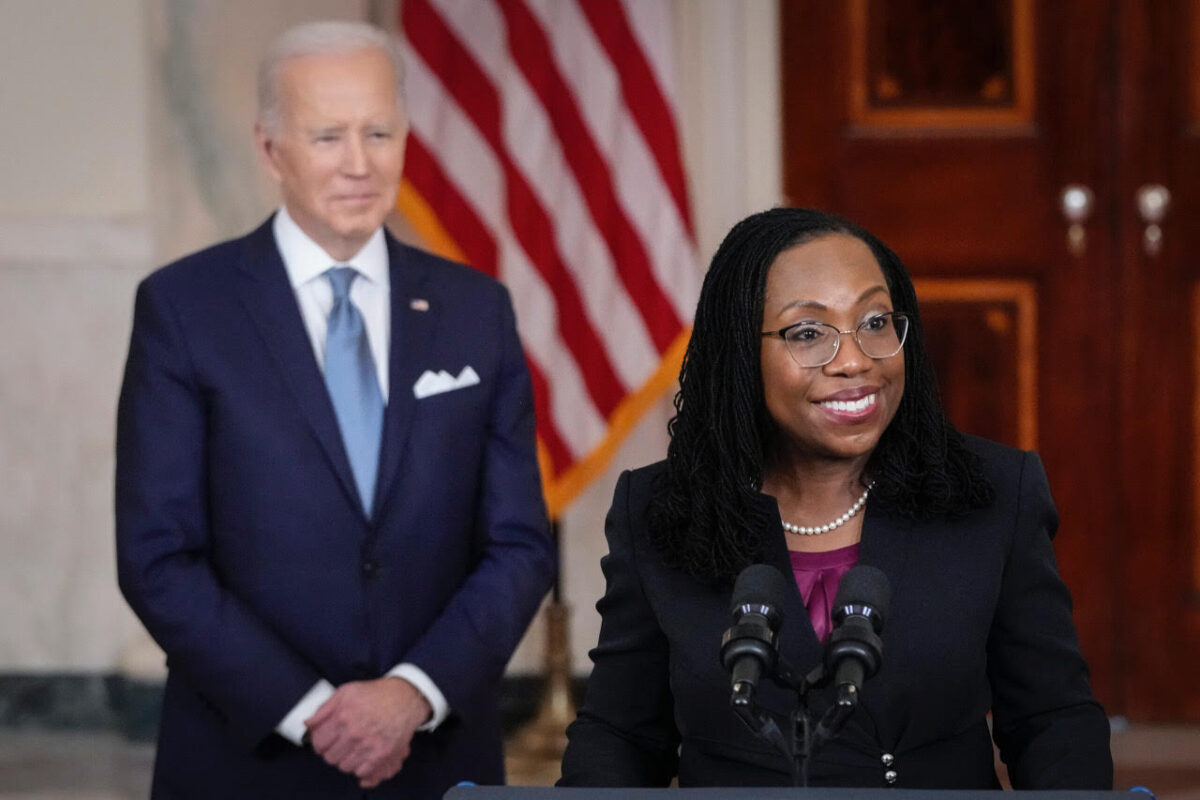History in the Making – Senate Confirms Ketanji Brown Jackson to Supreme Court –

WASHINGTON, DC – FEBRUARY 25: U.S. President Joe Biden (L) looks on as Ketanji Brown Jackson, circuit judge on the U.S. Court of Appeals for the District of Columbia Circuit, delivers brief remarks as his nominee to the U.S. Supreme Court during an event in the Cross Hall of the White House February 25, 2022 in Washington, DC. Pending confirmation, Judge Brown Jackson would succeed retiring Associate Justice Stephen Breyer and become the first-ever Black woman to serve on the high court: Drew Angerer/Getty
By Glynn Wilson –
WASHINGTON, D.C. — Judge Ketanji Brown Jackson was confirmed by the Senate as the first African American woman to the United States Supreme Court on Thursday in a somewhat bipartisan vote of 53-47. Three Republicans joined Democrats in supporting President Biden’s nominee, including Senators Mitt Romney of Utah, Lisa Murkowski of Alaska and Susan Collins of Maine.
A clear path to the Supreme Court opened up this week for Judge Jackson when the Senate voted 53 to 47 to advance her nomination to a vote of the full Senate, in spite of an 11-11 tie on the Judiciary Committee.
Then Senators Mitt Romney of Utah and Lisa Murkowski of Alaska joined a third Republican, Susan Collins of Maine, in announcing their support for Judge Jackson, in spite of bitter Republican resistance to seeing the first African American woman on the nation’s highest court.
All 11 Republicans on the Judiciary Committee voted against her nomination Monday, but that will not stop President Joe Biden’s first appointment to the Supreme Court to make it through confirmation successfully.
If all 48 Democrats and the two independents who caucus with them vote for her confirmation, along with the three Republicans who have said they would vote for her, that would make the final vote 53-47, one vote better than the 52-48 vote received by Clarence Thomas in 1991.
Democrats expect that vote will happen later this week ahead of a planned recess for the Easter holiday.
Democrats on the Judiciary Committee cited Jackson’s judgment as the main reason for their support, writing that her “credentials, experience, and evenhanded approach to the administration of justice make her an outstanding nominee to the Supreme Court.”
Jackson, 51, served eight years as a federal trial court judge and was confirmed for a seat on the U.S. Court of Appeals for the District of Columbia last June. Before becoming a judge, she worked as a public defender. If confirmed, she would also be the first Supreme Court justice since Thurgood Marshall to have represented indigent criminal defendants.
Jackson’s confirmation would not change the court’s ideological balance, now a 6-3 conservative majority. If confirmed as expected, she will join the court in the summer when Justice Stephen Breyer retires.
American voters broadly support Jackson’s confirmation. A poll from Marquette University Law School after her confirmation hearings showed that 66 percent of adults say they would support her nomination, while 34 precent said they would not.
Jackson was seen as at least “somewhat qualified” by 88 percent of the public while only 12 percent saw her as “not qualified.”
In a statement announcing her support for Judge Jackson, Murkowski, who is not on the committee, said she was backing the nominee in part to reject “the corrosive politicization of the review process for Supreme Court nominees, which, on both sides of the aisle, is growing worse and more detached from reality by the year.”
She also praised the judge’s “qualifications, which no one questions; her demonstrated judicial independence; her demeanor and temperament; and the important perspective she would bring to the court” in replacing Justice Breyer.
Romney issued his statement of support calling Judge Jackson “a well-qualified jurist and a person of honor.”
Their support came after another contentious day in the Judiciary Committee hearing room, where Republicans spent hours vehemently reiterating their opposition to her confirmation, calling her a “progressive activist” who was “soft on crime.”
“This choice of Judge Jackson was really embraced by the most radical people in the Democratic movement to the exclusion of everyone else,” said Senator Lindsey Graham, a Republican from South Carolina and a former supporter of Judge Jackson — until the president refused to pick a nominee Graham wanted from South Carolina, Judge Michelle Childs.
The N.A.A.C.P. called the resulting deadlock in the panel a “stain” on the committee, and Democrats moved immediately to force the nomination to the floor with a vote of the full Senate.
Democrats praised her qualifications and demeanor and said Biden’s nominee deserved to be confirmed.
“We shouldn’t have to be taking this step, but we are moving forward all the same without delay despite Republicans opposing her in committee,” Senate Majority Leader Chuck Schumer, a Democrat from New York, said before the vote.
“This is a historic moment for the committee and America,” said Senate Judiciary Committee Chair Richard J. Durbin, a Democrat from Illinois.
The partisan fight showed just how bitterly divided the Senate has grown over the past few decades in the approval of Supreme Court nominees, once regarded by members of both parties more respectfully as a matter of allowing the president to choose a candidate to serve on the court with bipartisan approval.
Republicans complained about past Democratic treatment of Supreme Court nominees named by Republicans, but Monday’s hearing was far different from the one Democrats held when they considered the nomination of Clarence Thomas in 1991, when Biden led the panel.
At the time, rather than uniting against him en masse, Democrats agreed to send his nomination to the floor without a recommendation, despite their deep misgivings amid allegations of sexual harassment. On Monday, Republicans refused to take a similar step, citing their view that Judge Jackson was “too liberal.”
“We are supposed to be trained seals over here clapping when you nominated a liberal,” Graham said. “That’s not going to work.”
He warned that when Republicans next control the Senate, they would routinely deny Democratic judicial nominees a hearing they considered too liberal.
Senator Cory Booker, a Democrat from New Jersey, accused Republicans of creating a caricature of Judge Jackson that is “so far out of the lines” of reality considering her deep credentials and experience. He said he had heard from people who asked: “How could they create these exaggerations? How could they disrespect a person like her, who has done everything right in her life and in her journey?”
Democrats defended Judge Jackson’s record, noting along the lines of several independent analysts, that her sentencing history has fallen well within the mainstream of the federal judiciary. They accused Republicans and conservative groups of distorting her record, pointing to her strong support from law enforcement groups. They said many Trump administration nominees had issued similar sentences, but were uniformly approved by the same Republicans lining up against Judge Jackson.
Democrats said the Republican assault was as much about the coming midterm elections as it was about Judge Jackson herself.
“The principal goal here is about stirring up political division and scoring political points,” said Senator Chris Coons, a Democrat from Delaware.
The support of the three Republicans undercut the assault by their colleagues.
In her statement, Murkowski said the judge’s backing “from law enforcement agencies around the country is significant and demonstrates the judge is one who brings balance to her decisions.”
Even as Republicans on the panel uniformly said they would oppose her, many offered her personal and professional praise.
Senator Ted Cruz, the Texas Republican who on Monday said that Judge Jackson would be the most extreme liberal ever to sit on the court, called her charming and talented.
“I’ve known her for 30 years and always liked her personally,” he said.
J. Michael Luttig, a former federal appeals court judge revered by conservatives, who supports Judge Jackson, said Cruz was badly distorting her record.
“I would not hesitate to retract my endorsement of Judge Jackson for the Supreme Court if there were anything at all to Senator Cruz’s statement, but there is not,” he wrote on Twitter. “In fact, quite the opposite is the case.”
Senator Amy Klobuchar, a Democrat from Minnesota, said the Republican opposition was disappointing but not surprising. She said the strong response to Judge Jackson showed that the public was not persuaded by the Republican attacks.
“People watching knew exactly what was going on,” she said. “And they weren’t buying what they were selling.”
___
We will add the full Senate vote to the lede of this story when the vote takes place, most likely Thursday.













